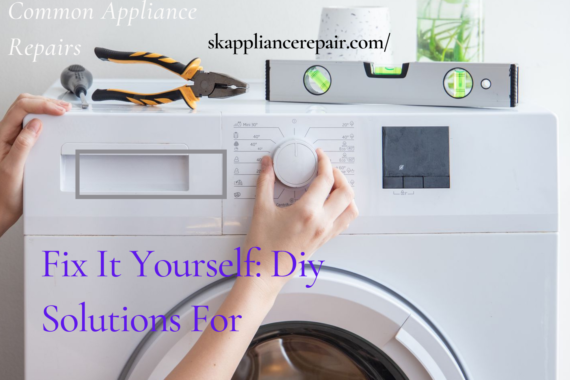In Washington DC, where seasonal weather changes can be extreme, your home’s appliance maintenance is not just a good practice, it’s a necessity. The humid summers and cold winters in the DC area can take a toll on your appliances, such as refrigerators. Without proper maintenance, these essential machines could malfunction or wear out sooner than expected, leading to costly repairs or even premature replacements. By staying proactive with regular upkeep, you can extend the lifespan of your appliances, improve energy efficiency, and avoid inconvenient breakdowns.
Refrigerator Maintenance Tips for Washington DC Homeowners
A well-working refrigerator is essential for keeping your food fresh and ensuring energy efficiency. Washington DC is known for its seasonal climate, particularly the humid summers, which can put additional strain on your refrigerator, so proper upkeep is critical. Here are some key tips to help prolong the life of your fridge and avoid costly repairs:

1. Clean the Condenser Coils Regularly
The condenser coils, located either on the back or bottom of your refrigerator, are responsible for releasing heat from the unit. Over time, dust and debris can accumulate on the coils, making it harder for your fridge to maintain the right temperature. This can lead to higher energy consumption and even overheating.
Tip: Clean the coils every 6-12 months using a vacuum or coil brush, especially before and after Washington DC’s hot summer months to ensure optimal cooling performance.
2. Check and Replace Door Seals
Faulty or loose door seals (gaskets) can cause cool air to escape, forcing your refrigerator to work harder to maintain the desired temperature. This not only wastes energy but can also shorten the lifespan of the appliance.
Tip:
- Inspect the door seals regularly by closing a piece of paper in the door, if the paper slips out easily, it’s time to clean or replace the seals.
- Ensure they are free from debris and tightly closed to avoid temperature loss.
3. Maintain Proper Temperature Settings
Keeping your refrigerator and freezer at the correct temperature is essential for both food preservation and energy efficiency. In Washington DC’s changing seasons, the temperature setting should be checked regularly.
Tip: Set the refrigerator to 37-40°F (3-4°C) and the freezer to 0°F (-18°C) for optimal efficiency. This balance will ensure your food stays fresh without overworking the appliance.
4. Replace the Water Filter
If your refrigerator has a water dispenser or ice maker, it’s important to replace the water filter every six months to prevent the buildup of contaminants and ensure clean water. Regularly replacing the filter also helps the water system run more efficiently.
Tip: Mark your calendar for filter replacements, and be extra vigilant during the summer when DC residents tend to use these features more frequently
Washer and Dryer Maintenance Tips for Washington DC Residents
Proper care of your washer and dryer not only extends their lifespan but also helps them run more efficiently, saving you time, energy, and money. With Washington DC’s often humid climate, these machines can be subjected to added wear and tear, making regular maintenance crucial. Here are some essential tips for keeping your laundry appliances in top shape:
1. Avoid Overloading the Washer
It can be tempting to throw in an extra load to save time, but overloading your washing machine puts significant stress on its drum and motor. This can lead to premature breakdowns and costly repairs.
Tip:
- Always follow the manufacturer’s load size recommendations.
- If your machine starts vibrating excessively or making strange noises, it could be a sign of overloading or an imbalance in the load.
2. Clean the Lint Trap and Dryer Vent Regularly
A clogged lint trap or dryer vent can drastically reduce dryer efficiency and pose a fire hazard. In Washington DC, where humidity levels are high in the summer, this problem can worsen due to excess moisture in the air.
Tip: Clean the lint trap after every load and check the dryer vent for blockages at least once a year. This will help your dryer run smoothly and reduce drying times.
3. Inspect Washer Hoses for Leaks
Washer hoses are subject to wear and tear over time, especially in areas with hard water, which is common in Washington DC. Leaks or cracks in the hoses can lead to water damage and reduced washer efficiency.
Tip:
- Inspect the hoses for signs of bulging, cracking, or leaking every few months.
- Consider replacing rubber hoses with stainless steel braided hoses, which are more durable.
4. Level Your Washer to Avoid Excess Vibration
An unbalanced washer can cause excessive vibration during the spin cycle, leading to noise and potential damage to the machine and surrounding flooring. Tip: Check that your washer is level by adjusting its feet. If the machine wobbles or makes loud noises, it may be uneven. A level washer will help minimize wear and tear and ensure optimal performance.
Dishwasher Maintenance Tips
A dishwasher is a key time-saver in the kitchen, but without proper care, it can lose its efficiency and start developing issues like poor cleaning or water leaks. Washington DC residents, particularly those dealing with the region’s hard water, should follow these maintenance tips to keep their dishwashers running smoothly:
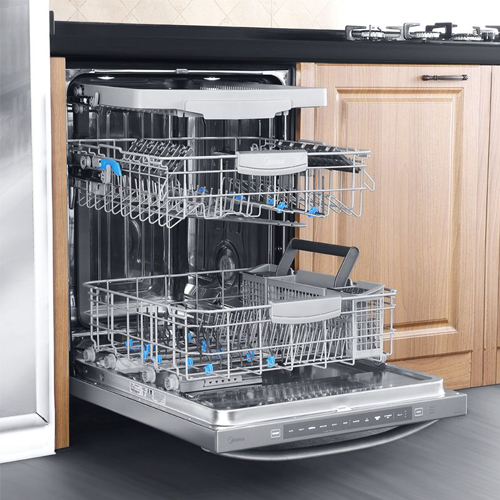
1. Clean the Filter and Spray Arms Regularly
Over time, food particles and debris can clog the dishwasher’s filter and spray arms, reducing water flow and cleaning power. This is especially common in areas with hard water, like Washington DC, where mineral buildup can add to the problem.
Tip: Clean the filter once a month and remove the spray arms to rinse out any debris or buildup. This ensures optimal water pressure and cleaning efficiency.
2. Run Hot Water Before Starting the Dishwasher
In colder months, Washington DC’s tap water can be cooler, which affects the dishwasher’s performance. Running hot water from the sink before starting the dishwasher helps to ensure that the water entering the machine is hot from the beginning, improving cleaning results.
Tip: Let the tap run until the water is hot, then start the dishwasher to get the best wash cycle.
3. Inspect the Seals and Gaskets for Leaks
The seals and gaskets around your dishwasher door are responsible for keeping water inside the unit. If they become worn or cracked, they can cause leaks and inefficiency.
Tip:
- Check the door seals regularly for signs of wear and clean them with a damp cloth to remove any food residue.
- Replace any damaged seals to prevent water from escaping during the wash cycle.
4. Use a Dishwasher Cleaner to Prevent Buildup
Washington DC’s hard water can lead to mineral buildup inside your dishwasher, affecting its efficiency and leading to clouded glassware or residue on dishes.
Tip: Use a dishwasher cleaner or run an empty cycle with vinegar once a month to break down mineral deposits and keep the interior sparkling clean.
Oven and Stove Maintenance Tips for Washington DC Residents
A well-maintained oven and stove are essential for ensuring safe, efficient cooking in your home. if you live in Washington DC, you should pay special attention to these appliances, especially during colder months when ovens are used more frequently. Follow these maintenance tips to keep your cooking appliances in top shape:
1. Clean Burners and Oven Regularly
Grease, food spills, and grime can accumulate on burners and inside your oven, reducing efficiency and increasing the risk of fire. Regular cleaning ensures optimal heating performance and safety.
Tip:
- Wipe down the stovetop and burners after every use to prevent buildup.
- For the oven, use a mild cleaner or a baking soda paste to remove grease and food residue every few months.
2. Check and Replace Oven Door Seals
If your oven door doesn’t seal properly, heat can escape, leading to uneven cooking and longer preheating times. This wastes energy and can make cooking difficult.
Tip: Inspect the rubber or fiberglass seals around the oven door regularly for cracks or gaps. If you notice any damage, replace the seals to ensure proper heat retention and energy efficiency.
3. Avoid Using the Self-Cleaning Feature Too Often
While the self-cleaning feature is convenient, it subjects the oven to extremely high temperatures, which can wear down internal components like the heating element and thermostat.
Tip: Instead of using the self-cleaning feature frequently, clean the oven manually with safe, non-abrasive cleaning products to prevent excessive wear and tear.
4. Inspect Gas Lines and Igniters (For Gas Stoves)
If you have a gas stove or oven, it’s crucial to inspect the gas lines for leaks and make sure the igniters are functioning properly. Faulty igniters or gas leaks can be dangerous, leading to inefficient heating or, in extreme cases, fire hazards.
Tip: Periodically check the gas lines for any odor of gas, which indicates a leak, and test the igniters to ensure they ignite quickly. If you detect any issues, call a professional to handle repairs safely.
Water Heater Maintenance Tips
Your water heater is an essential part of your home, particularly during the DC’s chilly winters. Without proper maintenance, it can lose efficiency, resulting in higher energy bills, inconsistent water temperatures, or even breakdowns. Regular maintenance can extend the life of your water heater and improve its performance. Here are some essential tips for you:
1. Flush the Tank to Remove Sediment Buildup
Washington DC’s water supply often contains minerals that can accumulate at the bottom of your water heater’s tank, especially if your home has hard water. This sediment buildup can reduce the efficiency of your water heater and cause it to overwork, leading to higher energy consumption and a shorter lifespan.
Tip: Flush the water heater tank at least once a year to remove sediment and maintain optimal performance. This is particularly important in areas with hard water, like DC.
2. Check the Temperature Setting
Maintaining the right temperature setting on your water heater can save energy and prevent the risk of scalding. The Department of Energy recommends keeping the temperature at 120°F (49°C) to balance safety and energy efficiency.
Tip: Check the thermostat on your water heater and adjust it as necessary to ensure the temperature stays at a safe and efficient level.
3. Inspect for Leaks and Corrosion
Regularly inspect your water heater for any signs of leaks, corrosion, or rust. Leaks can indicate a serious issue that may require professional repair or replacement, while corrosion on the exterior could lead to a weakened tank.
Tip: Check the area around the water heater for any puddles of water or moisture, and inspect the tank for rust spots. If you notice any signs of corrosion or leaks, it’s best to call a professional to assess the situation.
4. Test the Pressure Relief Valve
The pressure relief valve is a crucial safety component that releases pressure if the tank becomes too hot or builds up too much pressure. A faulty pressure relief valve can lead to dangerous situations.
Tip: Test the pressure relief valve every six months by lifting the valve’s lever and allowing it to snap back. If water flows out when you lift the lever and stops when you release it, the valve is working correctly. If not, you may need to replace it.
5. Insulate the Water Heater and Pipes
In colder climates like Washington DC’s winter months, insulating your water heater and the surrounding pipes can prevent heat loss and reduce energy consumption. Insulating the tank helps the water heater maintain its temperature without overworking.
Tip: Install an insulation blanket around the water heater and insulate the pipes leading to and from the tank, especially if they run through unheated areas of your home.
Energy Efficiency Tips for Appliances in Washington DC
Improving the energy efficiency of your home’s appliances is one of the easiest ways to reduce energy bills and minimize environmental impact, especially in Washington DC where utility costs can fluctuate throughout the year. Here are some key tips for enhancing your appliance efficiency:

1. Upgrade to Energy-Efficient Appliances
One of the most effective ways to improve your home’s energy efficiency is to upgrade old appliances to ENERGY STAR-certified models. These appliances are designed to use less energy without sacrificing performance. Tip: Look for ENERGY STAR labels when purchasing new refrigerators, dishwashers, washers, and dryers to ensure they meet energy-efficiency standards. This is particularly important in DC, where energy use spikes during hot summers and cold winters.
2. Use Appliances During Off-Peak Hours
Washington DC residents can take advantage of lower electricity rates by using major appliances during off-peak hours. DC’s energy providers often charge higher rates during peak demand times, typically in the afternoon and early evening. Tip: Run your dishwasher, washing machine, and dryer early in the morning or late at night to take advantage of lower rates and reduce the load on the grid.
3. Optimize Refrigerator Settings
Your refrigerator runs 24/7, making it one of the largest energy consumers in your home. Keeping it properly maintained and set at the right temperature can help reduce energy usage. Tip: Set your refrigerator to 37-40°F and the freezer to 0°F for optimal efficiency. Make sure the door seals are in good condition to prevent cold air from escaping, and avoid overcrowding the fridge to ensure proper airflow.
4. Use Cold Water for Laundry
Washing your clothes in cold water can significantly reduce your energy consumption, as heating water accounts for about 90% of the energy used by washing machines. In Washington DC, where energy costs can be high during the summer months, this simple switch can lead to noticeable savings. Tip: Use cold water for most laundry loads and choose energy-efficient settings to cut down on energy usage.
5. Unplug Appliances When Not in Use
Many appliances, like microwaves, coffee makers, and even TVs, consume energy when they are plugged in, even if they are not in use. This “phantom” or standby power can add up over time. Tip: Unplug small appliances when not in use, or use a power strip to easily turn off multiple devices at once. This small step can help reduce your energy bills, especially in a city like Washington DC, where electricity costs can be high.
Signs It’s Time to Call a Professional Appliance Repair Service
While regular maintenance can help extend the life of your home appliances, there will come a time when professional repair services are necessary. Recognizing the signs early on can save you from more expensive repairs or replacements down the line.
For Washington DC., knowing when to call in a professional can prevent inconvenience and keep your household running smoothly. Here are some key indicators that it’s time to contact an expert:
1. Unusual Noises
If your appliance starts making loud or strange noises, such as grinding, squealing, or banging, it could be a sign of mechanical failure. For example, a washing machine that shakes violently or a refrigerator that makes persistent buzzing sounds might need immediate attention.
Tip: Pay attention to any changes in noise levels and contact a professional to diagnose and fix the problem before it worsens.
2. Inconsistent or Poor Performance
When your appliance starts to underperform—such as a dryer that doesn’t fully dry clothes or a refrigerator that struggles to keep food cold—it’s often a sign that something is wrong internally. Ignoring these issues can lead to more severe damage.
Tip: If you notice your appliances aren’t performing as well as they used to, it’s time to schedule a service call.
3. Electrical Issues or Frequent Tripping of Circuit Breakers
Appliances that cause your circuit breaker to trip or show signs of electrical issues (such as flickering lights or sparks) can be hazardous. These problems often indicate faulty wiring, overheating, or a motor malfunction.
Tip: Turn off the appliance immediately and call a professional, as electrical problems can lead to fires or other serious safety hazards.
4. Visible Leaks or Water Damage
Appliances like dishwashers, washing machines, and refrigerators are prone to leaks, which can cause water damage to your home. A small leak might seem harmless, but it could be an early sign of a larger problem, such as a cracked hose or a malfunctioning pump.
Tip: If you see puddles of water or notice water damage near your appliances, it’s time to call a repair service to address the issue.
5. Foul Smells or Burning Odors
If you detect any strange or burning odors coming from your appliances, it’s essential to act quickly. These smells could indicate overheating, electrical problems, or even gas leaks in appliances like ovens or dryers.
Tip: Unplug the appliance and contact a professional to inspect and repair the issue. Never ignore burning smells, as they can pose serious safety risks.
6. The Appliance is Not Turning On or Randomly Shutting Off
If your appliance refuses to turn on or keeps shutting off unexpectedly, there could be an internal issue such as a malfunctioning control board, motor failure, or electrical wiring problem.
Tip: Before assuming the appliance is broken, check for any tripped circuit breakers or blown fuses. If the issue persists, call a repair technician to troubleshoot and repair the problem.
Seasonal Appliance Maintenance Tips for Washington DC
Each season brings challenges for home appliances, particularly in a region like Washington DC, where residents experience both hot, humid summers and cold winters. To ensure your appliances run smoothly year-round, it’s important to perform seasonal maintenance that addresses the specific needs of each time of year. Here are some essential appliance maintenance tips for every season:
Spring Maintenance Tips
As the weather warms up, spring is the perfect time to clean your home appliances and ensure everything is running smoothly for the summer months ahead.
- Refrigerator: Clean the coils behind or beneath your refrigerator to improve efficiency and prolong the life of the unit. This helps your fridge keep cool as temperatures rise outside.
- Dishwasher: Check and clean the dishwasher’s filter and spray arms to remove any debris that accumulated during winter use. Run a cleaning cycle with a dishwasher cleaner to remove mineral buildup.
- Washing Machine: Spring is a great time to clean your washing machine by running a hot water cycle with vinegar and baking soda to eliminate odors and mold. Check hoses for any leaks or cracks after the colder months.
Summer Maintenance Tips
With high temperatures and increased humidity in Washington DC, summer can put additional strain on your appliances, particularly those that help keep your home cool and comfortable.
- Air Conditioner (AC): Before the heat sets in, clean or replace your AC filters and ensure the unit is running efficiently. Clean the exterior unit and remove any debris to improve airflow and cooling performance.
- Refrigerator: In DC’s hot and humid summer, your fridge works overtime to keep food cool. Make sure the door seals are intact to prevent cold air from escaping, and keep the fridge stocked to help it maintain a consistent temperature.
- Outdoor Appliances: For those with outdoor kitchens or grills, clean these thoroughly before the start of grilling season. Inspect gas lines for leaks and check that the burners are clean and functioning correctly.
Fall Maintenance Tips
As the weather cools and DC homeowners prepare for winter, fall is a key time to perform maintenance on heating-related appliances.
- Furnace/Heater: Check and replace the air filters in your furnace or heating system to ensure it runs efficiently during the winter months. Schedule a professional inspection to catch any issues before temperatures drop.
- Oven: Fall is when many homeowners start using their ovens more frequently. Clean the oven and check the door seals to prevent heat from escaping and to ensure even cooking. This will also reduce energy consumption during the colder months.
- Water Heater: Flush your water heater in the fall to remove sediment buildup, which can reduce efficiency and lead to higher energy costs during the winter months when hot water demand is higher.
Winter Maintenance Tips
Washington DC winters can be cold, so it’s important to ensure your appliances are prepared to handle increased usage during the season.
- Washer/Dryer: In colder temperatures, washing machines can freeze if left in unheated spaces. Keep the machine in a warm area or winterize it by shutting off the water and draining the hoses. Clean the dryer’s lint trap and inspect the vent to prevent fire hazards during increased use.
- Heating System: Ensure your heating system is running efficiently throughout the winter by regularly checking and replacing filters. Monitor the thermostat to avoid overworking the system and causing unnecessary wear.
- Dishwasher: During the winter, DC’s tap water can become cooler, affecting how well your dishwasher cleans. Running the hot water in your sink before starting the dishwasher can help the appliance work more efficiently.
Conclusion: Keep Your Washington DC Home Appliances Running Smoothly Year-Round
Proper appliance maintenance is essential for keeping your Washington DC home running smoothly, no matter the season. From performing seasonal checkups to addressing small issues before they become major problems, these maintenance tips will help you extend the life of your appliances, improve their energy efficiency, and save on repair costs in the long run. Whether you’re dealing with the sweltering heat of a DC summer or the chilly winter months, taking care of your appliances ensures they work reliably when you need them the most.
If you’re ever unsure about performing certain maintenance tasks or notice signs that something may be wrong, don’t hesitate to contact us as we are a professional appliance repair service in Washington DC. Investing in professional inspections and timely repairs can prevent costly breakdowns and help you maintain a comfortable, efficient home environment year-round.
By following these guidelines, Washington DC homeowners can enjoy peace of mind, knowing their appliances are operating at their best, no matter the season.


